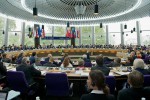On 4-6 March 2014, Strasbourg, the Committee of Ministers of the Council of Europe, which supervises the execution of judgments of the European Court of Human Rights, in the course of its 1193rd meeting examined implementation of human rights judgments by State parties to the European Convention on Human Rights. In their decision, the representatives of member states noted that those structural problems outlined in the European Court judgments remain unsolved by the Russian Federation.

(Image courtesy of http://www.trautweiler.ch)
It should be explained that ECHR judgments oblige a State not only to pay compensations, but also to take individual measures to secure to the maximum possible extent the applicant’s rights (for instance, referring the case for a new trial), and general measures aimed at systematic problem solving.
Previously, in September 2012, in the course of its 1150th meeting, the Committee of Ministers examined the group of cases «Khashiev and Akaeva v Russia» related to human rights violations in Chechnya, and issued instructions for Russia to execute the ECHR judgment in the case «Aslakhanova and others v Russia», which implied certain measures.
In August 2013 Russian authorities submitted an updated action plan, containing information on the measures taken and actions planned to be implemented by the authorities.
The Action Plan introduced the following measures to be taken:
– improvement and intensification of the missing persons search, including by means of ensuring appropriate interagency coordination and DNA databases usage;
– strengthening supervision of investigation, and ensuring victims’ access to investigation materials;
– improving judicial means of legal defense in respect of compensation payments.
During the present meeting the Committee of Ministers noted that the action plan submitted by Russia does refer to the measures indicated by the Court. However, no information was provided on the measures actually taken to improve domestic investigations into the incidents.
The Committee stressed the strong need for decisive measures in respect of ongoing sufferings of the relatives of the forced disappeared persons, and in respect of the established ineffectiveness of the investigations, which entails impunity for those responsible for grave human rights violations.
In order to rectify the situation with forced disappearances, the Committee exhorted Russia to develop without further delay an appropriate centralized independent legal mechanism tasked with search for disappeared individuals and empowered to allocate resources needed for wide-scale research and analysis, and to reinforce efforts to improve the procedure of paying compensation to families of deceased individuals.
The Deputies also expressed their grave concern about the application of acts of amnesty to those responsible for grave human rights violations, and urged Russia to alter the action plan as regards the statute of limitations for civil action. The Russian Federation is also invited to submit additional explanations concerning victims’ access to case files.
As related to individual measures, the Deputies expressed serious concern that Russian authorities had failed to make submissions on additional investigations (including in Isayeva, Abuyeva and others v Russia), and requested to submit the information without further delay.
As for the Garabaev group, the Committee of Ministers expressed serious concern that present whereabouts of applicant Azimov, reported to have been again abducted on 3 December 2013, remain unestablished.
The Committee of Ministers strongly urged Russian authorities to provide information promptly on how they will ensure the practical implementation of the required protective and preventive mechanism (notably, as regards the application of protection measures available to victims and witnesses in criminal proceedings); and to transmit further details on the measures aimed at ensuring close scrutiny of the investigations.
Therefore, the Russian Federation is invited to submit additional information concerning general measures aimed at preventing further similar incidents, and individual measures aimed at terminating the ongoing violations and eliminating, to the maximum extent possible, their negative effects on the victims.
The Committee of Ministers deeply regretted that the general measures undertaken by the Russian Federation did not appear to have been sufficient. This appears, inter alia, from the number of similar complaints against the State. Thus, the absence of progress suggests that the measures taken as regards systematic problem solving remain ineffective.
The European Court has stressed at a number of occasions that repeated nature of violations is probably caused by the established practice of Russian authorities ignoring their obligations under the national law and the Convention.
The Committee of Ministers decided to resume consideration of these issues at its 1208th meeting (September 2014).